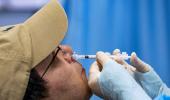Renowned virologist Gangandeep Kang on Friday said India has reported a few cases of Omicron sub-variants XBB and BF.7, but they have not driven an upsurge, and she does not expect a spike in COVID cases.

Her remarks come in the backdrop on the highly transmissible Omicron strains, mostly BF.7, causing a spike in coronavirus cases in many countries, including China.
"They are, like all Omicron sub-variants, very good at infecting people because they escape the immune response that prevents infection, but are not causing more severe disease than Delta," the professor at the Christian Medical College's division of gastrointestinal sciences tweeted.
Kang said that "at the moment, India is doing fine" but maintained that surveillance should be ensured to "detect signal of any changes in the behaviour of the virus".
BF.7 is a sub-lineage of the Omicron variant BA.5 and has the strongest infection ability since it is highly transmissible, has a shorter incubation period and has a higher capacity to cause reinfection or infect even those vaccinated.
China is opening up fast at a time when their population has low levels of exposure to natural infection, she said, adding that "the current circulating variants are Omicron, which have evolved in vaccinated populations and are therefore very infectious".
Kang said most of China's population has received two doses of vaccines.
"Most infections can be managed at home, but sheer numbers mean that even a small proportion getting severely ill, means that many people will have severe disease and that a proportion of those will die," she said in another tweet.
"At the moment, India is doing fine. We have few cases, we have had the XBB and BF.7 for a while and they have not driven an upsurge in India. In the absence of an even more highly infectious variant, I do not expect a surge," the virologist tweeted.
Noting that Omicron does result in severe disease in a proportion of the infected, but it is not as severe as that caused by the Delta variant, she said it is not mild, but it does infect the upper respiratory tract more than the lower.
"Each new sub-variant thrives only if it is better at immune escape than the prior ones. Therefore, greater infectiousness of new variants is a given and not news," the virologist said on Twitter.
"Worry with China is not just the tragedy unfolding for them as they undergo what we have already experienced, but that high levels of replication mean increased opportunity for new variants to emerge," she said.
Kang said there is a need to maintain variant and clinical surveillance to ensure that "we detect signal of any changes in the behaviour of the virus".
"This is a public health function where stable surveillance runs in the background and ramps up for emerging threats," she said.
She said randomly increasing testing has little value. "Testing incoming travellers needs a risk-based framework, but 'X per cent' sampling also means that you accept that every incoming case will not be detected. In other words, increasing testing needs a strategic approach," Kang said.
"Our population is vaccinated with the primary series, and has had high rates of infection (90 per cent estimated). Most infections were during Omicron, and this gives us hybrid immunity. How long will it last and vaccines?" Kang tweeted.










